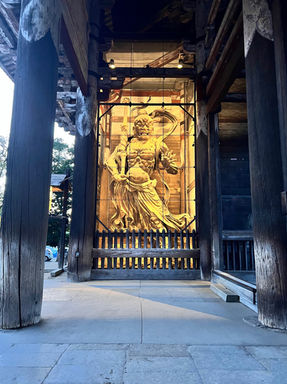Experience Abroad
A reflection of my experience abroad in Osaka, Japan; and a collection of the photos I have taken.



Cultural Reflection
I have always been interested in learning about different cultures and traditions. However, outside of exposure to anime, I had no knowledge about the Japanese language or about the culture of Japan. During highschool, I came across Hikaru Utada, a Japanese-American artist, through a game called Kingdom Hearts. Since then my desire to understand the lyrics behind her powerful songs have continuously sparked my interest in learning Japanese. Throughout my journey of learning Japanese, I was taught the importance of learning about Japanese through the scope of the culture itself. At its core, culture and language are intertwined and influence one another.
Studying abroad is an experience that is said to have a positive impact towards self-development, learning a foreign language, and towards the development of understanding cultural differences. With this in mind, in fall of 2022, I chose to study abroad at Kansai Gaidai University in Osaka, Japan as the prefecture is widely known for having amazing food and outgoing locals.
While living in Osaka, the concepts of uchi (内) and soto (外) are an aspect of Japanese culture that I have experienced and learned about, and refer to the distinction between inside and outside groups. Uchi refers to one's in-group or inner circle, which includes family members, close friends, and colleagues. People within the uchi group are expected to be loyal, supportive, and cooperative and are characterized by a sense of intimacy and mutual obligation. Soto, on the other hand, refers to outsiders, those who are not part of the uchi group. This type of relationship is less personal and more formal. In Japanese society, uchi and soto are deeply ingrained in social interactions, and they influence behavior, communication, and decision-making. For example, in business settings, companies often prioritize hiring and promoting individuals from their uchi network rather than outsiders. In personal relationships, uchi ties are considered more important than soto ties, and people are expected to prioritize the needs of their uchi group over those of outsiders.
Another aspect of Japanese culture that I’ve learned about is the concept of respectful speech, Keigo, an important part of sociolinguistics in the Japanese language. Keigo consist of three distinct categories: Teineigo (polite forms), Sonkeigo (respectful or exalting forms), and Kenjougo (modest or humble forms). The most commonly used form of respectful language is Teineigo and is often used in daily life to address individuals outside of your group: the aforementioned soto. Kenjougo is used to humble or lower oneself before another individual and is used in regards to your own actions. Contrastingly, Sonkeigo serves as a way to express regards and show respect when addressing others, elevating them up instead. Within this category titles are the most common, an honorific suffix usually used when referring to others. Similar to the English titles Mr. and Mrs, the suffix “san” in Japanese is the most commonly used honorific title used to show respect. During my daily life in Japan, I often heard Sonkeigo being used at train stations and towards me as a customer when going to shops and restaurants. During club activities as well, all underclassmen used Keigo when speaking with upperclassmen so an hierarchical latter (Jougei Kankei) could be observed. Concisely, polite speech influences vocabulary, verb conjugation, and the inflection of nouns within the Japanese Language. In Japanese society, which form of speech being used can give indications into social relationships.
Kansai Gaidai being a language school has provided me with plenty of opportunities to develop my listening and speaking abilities in an environment designed for success. Although there is a vast amount of information about Japanese culture and the language online, nothing can be compared to actually living in the culture and experiencing it firsthand. By being fully immersed, I had no choice but to be constantly exposed to the language regardless of what mode of learning I was involved in at the time. My experience studying abroad has promoted personal growth and development and made me a more adaptable person as I have had to step out of my comfort zone a numerous amount of times in an unfamiliar environment. Furthermore, experiencing a different culture through the perspective of those within while having the perspective of an outsider has also deepened my understanding of the value of having alternative points of view.
























